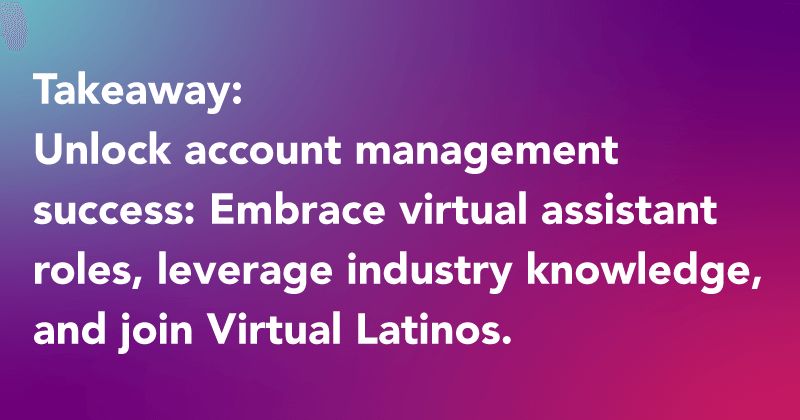Table of Contents
ToggleAccount managers stand as linchpins, fostering invaluable client relationships and driving organizational growth. As the business landscape undergoes constant metamorphosis, this comprehensive guide delves into the fundamentals of excelling in account management skills. From honing effective communication to mastering strategic problem-solving, it unfolds as an indispensable roadmap for professionals aiming to not just survive but thrive in this dynamic field.
Whether you’re a seasoned expert or an aspiring account manager, this guide empowers you with the knowledge to adeptly navigate challenges and seize opportunities within the ever-evolving business environment. Embark on a journey toward mastering the art of account management with confidence and competence.
Key Account Manager Skills
Navigating the dynamic landscape of account management demands a multifaceted skill set that goes beyond mere transactional abilities. In this section, we explore the fundamental skills that elevate Key Account Managers from proficient professionals to strategic assets.
These skills form the cornerstone of successful account management, empowering professionals to not only meet but exceed client expectations, foster enduring relationships, and contribute significantly to organizational growth.
A. Communication Skills:
Effective communication serves as the bedrock of successful account management. Whether articulating complex information or discerning client needs, the honing of verbal and written communication skills is paramount. Tailoring communication styles to resonate with diverse stakeholders enhances the effectiveness of interactions.
B. Relationship Building:
At the heart of account management lies the ability to establish and nurture robust client relationships. Beyond mere transactions, successful account managers focus on building trust, cultivating rapport, and actively networking within the industry. The emphasis is on forging long-term partnerships that transcend immediate business needs.
C. Negotiation and Sales Skills:
Negotiation prowess stands as a cornerstone skill for accomplished account managers. Proficiency in techniques that yield win-win outcomes, coupled with upselling and cross-selling strategies, contributes directly to revenue growth. The capacity to close deals and deftly handle objections ensures the success of transactions.
D. Organizational Abilities:
The intricate balancing act of managing multiple clients and projects necessitates strong organizational skills. Effective time management and prioritization are essential for meeting deadlines and consistently delivering results. The integration of project management skills further enhances efficiency in handling diverse account responsibilities.
E. Analytical and Problem-Solving Skills:
Informed decision-making in account management relies heavily on data analysis. Account managers need the capability to identify challenges, propose effective solutions, and adapt strategies based on dynamic market trends. Analytical and problem-solving skills are indispensable for staying ahead in a competitive business environment.

Industry-Specific Knowledge:
Understanding the intricacies of the client’s industry is a fundamental aspect of effective account management. Staying updated on market trends, competitors, and industry regulations positions account managers as knowledgeable partners who can provide valuable insights to their clients.
1. Market Trends:
- Continuously monitor and analyze market trends relevant to the client’s industry.
- Identify emerging patterns and shifts in consumer behavior that may impact the client’s business.
- Stay informed about innovations, technological advancements, and market disruptions that could influence industry dynamics.
2. Competitor Analysis:
- Conduct a thorough competitor analysis to understand the competitive landscape.
- Identify key competitors and their strengths, weaknesses, opportunities, and threats (SWOT analysis).
- Utilize competitive intelligence to position the client strategically within the market.
3. Regulatory Compliance:
- Keep abreast of industry regulations and compliance standards.
- Ensure that the client’s business practices align with current and upcoming regulatory requirements.
- Guide navigating regulatory changes and mitigating potential risks.
4. Customer Segmentation:
- Understand the diverse customer segments within the industry.
- Tailor account management strategies based on the unique needs and preferences of different customer groups.
- Implement personalized approaches to enhance customer satisfaction and retention.
5. Industry Challenges and Opportunities:
- Identify challenges and potential obstacles specific to the client’s industry.
- Proactively address challenges by developing strategic solutions.
- Capitalize on emerging opportunities to help clients stay ahead of the competition.
6. Technology Integration:
- Stay informed about technological advancements relevant to the industry.
- Explore opportunities for integrating new technologies to enhance the client’s operations and competitiveness.
- Provide insights into industry-specific software, tools, and platforms that can optimize business processes.
7. Networking and Industry Events:
- Attend industry conferences, seminars, and events to stay connected with key players.
- Build a network within the industry to gain valuable insights and foster collaborations.
- Share industry updates and best practices with clients to strengthen the partnership.
8. Data Analysis and Reporting:
- Utilize data analytics to extract meaningful insights from industry-related data.
- Generate regular reports highlighting key performance indicators and benchmarks within the industry.
- Leverage data-driven insights to guide strategic decision-making and optimize account management strategies.
By incorporating these aspects into their industry-specific knowledge base, account managers can elevate their role from mere service providers to strategic partners, fostering stronger relationships with clients and contributing significantly to the client’s overall success.
Soft Skills:
In addition to industry-specific knowledge, effective account management relies heavily on the mastery of soft skills. These interpersonal attributes not only enhance the client-manager relationship but also contribute to the overall success and resilience of account managers in dynamic business environments.
A. Emotional Intelligence:
Navigating client interactions with emotional intelligence is vital. Understanding and responding to the emotions of clients foster stronger connections and contribute to the overall success of the account manager-client relationship.
- Empathy: Demonstrate a deep understanding of the client’s perspective and feelings.
- Active Listening: Pay close attention to verbal and non-verbal cues, ensuring a thorough comprehension of the client’s concerns.
- Conflict Resolution: Effectively manage conflicts by addressing emotions and finding amicable solutions.
B. Resilience:
Resilience in handling setbacks and challenges is a trait shared by successful account managers. The ability to bounce back from setbacks, learn from experiences, and maintain a positive attitude contributes to long-term success.
- Problem-solving: Approach challenges as opportunities for growth and improvement.
- Optimism: Maintain a positive outlook, inspiring both the client and internal teams during challenging times.
- Continuous Learning: Use setbacks as learning experiences, adapting strategies for future success.
C. Adaptability:
The business landscape is constantly evolving, and adaptability is a key soft skill. Account managers who embrace change and proactively adjust their strategies to align with new trends and challenges are better positioned for success.
- Flexibility: Demonstrate the ability to adjust plans and strategies based on evolving client needs and industry trends.
- Innovation: Seek out and implement creative solutions to navigate uncertainties and disruptions.
- Proactive Learning: Stay ahead by continuously updating skills and knowledge to stay relevant in a rapidly changing business environment.
D. Effective Communication:
Clear and concise communication is the cornerstone of successful account management. Articulating ideas, providing updates, and addressing concerns clearly and compellingly enhances the overall client experience.
- Transparent Communication: Foster trust through open and honest communication with clients.
- Tailored Messaging: Customize communication styles to resonate with diverse clients and stakeholders.
- Feedback Loop: Establish a continuous feedback loop to ensure alignment and address any potential issues promptly.
By honing these soft skills, account managers not only create a positive and collaborative working environment but also position themselves as trusted partners capable of navigating the complexities of client relationships with finesse and effectiveness.

Tools and Technologies:
Staying well-versed in a diverse array of tools and technologies is crucial for ensuring not only efficiency but also a competitive edge.
Here’s an in-depth exploration of the key tools and technologies that modern account managers should be adept at:
Customer Relationship Management (CRM) Systems:
Definition: CRM systems are integral platforms that centralize customer information, interactions, and transactions. They provide a comprehensive view of customer behavior, enabling account managers to make informed decisions.
Significance: Proficiency in CRM systems enhances the ability to manage client relationships, track communication history, and anticipate customer needs. Popular CRMs include Salesforce, HubSpot, and Zoho CRM.
Skills Needed:
- Data Entry and Management
- Customization of CRM for specific business needs
- Analytics and Reporting from CRM data
Account Management Software:
Definition: Tailored account management software assists in overseeing and nurturing client relationships, helping account managers to efficiently handle tasks such as invoicing, contract management, and project tracking.
Significance: These tools go beyond generic CRMs, offering specialized features for account-centric tasks. Examples include Freshdesk, ClientSuccess, and Gainsight.
Skills Needed:
- Onboarding and utilization of account management software
- Customization according to specific business requirements
- Integration with other relevant tools in the tech stack
Communication and Collaboration Tools:
Definition: With remote work becoming more prevalent, leveraging communication and collaboration tools is essential for seamless interaction within account management teams and with clients.
Significance: Efficient communication fosters strong client relationships and ensures internal coordination. Examples include Slack, Microsoft Teams, and Zoom.
Skills Needed:
- Mastery of communication platforms
- Ability to conduct virtual meetings and presentations
- File sharing and collaborative document editing skills
Industry-Relevant Software:
Definition: Depending on the industry, account managers may need to be proficient in specialized software that caters to the unique needs of their clients.
Significance: Industry-specific tools enhance the ability to provide tailored solutions and insights. For instance, financial institutions might use Bloomberg Terminal, while marketing agencies may rely on tools like Google Analytics.
Skills Needed:
- Familiarity with industry-specific software
- Continuous learning to stay updated on emerging tools
- Adaptability to switch between different software based on client requirements
Data Analytics and Reporting Tools:
Definition: Account managers benefit from the ability to analyze data and generate insightful reports to guide decision-making.
Significance: Data-driven insights help in identifying trends, measuring performance, and making strategic decisions. Tools like Tableau, Google Data Studio, and Microsoft Power BI are commonly used.
Skills Needed:
- Data interpretation and analysis
- Report creation and visualization
- Regular updates on advancements in analytics tools
By cultivating proficiency in these tools and technologies, account managers can not only streamline their processes but also contribute significantly to the overall success and growth of the business they serve.
Unleashing the Power of Virtual Assistants in Account Management: Navigating the Digital Landscape
In the dynamic landscape of modern business, account managers are increasingly turning to virtual assistants to revolutionize their approach to customer relationships. This strategic shift is fueled by the recognition that embracing cutting-edge technologies can significantly enhance their efficiency and effectiveness.
The Digital Advantage: Elevating Account Management
Incorporating virtual assistants into account management practices is akin to unlocking a treasure trove of opportunities. These intelligent tools, exemplified by renowned platforms such as Salesforce, HubSpot, and Zoho CRM, go beyond the traditional realms of manual tasks. They propel account managers into a realm of unprecedented productivity, seamlessly blending automation and strategic organization.
Streamlining Workflows for Optimal Performance
One of the primary advantages of employing virtual assistants in account management is the ability to streamline workflows. These platforms are adept at automating routine tasks, freeing up valuable time for account managers to focus on high-priority activities that demand a human touch. Whether it’s managing leads, tracking interactions, or generating insightful reports, virtual assistants enable a more streamlined and efficient workflow.
Enhancing Organization and Precision
In the intricate world of account management, precision is paramount. Virtual assistants provide a structured and organized approach to data management, ensuring that critical information is readily available at the click of a button. By centralizing client data and interactions, platforms like Salesforce and HubSpot empower account managers to make informed decisions promptly, fostering stronger client relationships and optimizing the overall management process.
The Pinnacle of Customer Relationship Management
Virtual assistants not only streamline internal processes but also elevate the entire customer relationship management (CRM) experience. Through sophisticated analytics and data-driven insights, these tools empower account managers to anticipate client needs, personalize interactions, and cultivate a proactive approach to account management. Salesforce, HubSpot, and Zoho CRM stand out as exemplary platforms that transcend the conventional CRM model, propelling account managers toward the pinnacle of client-centric practices.
Looking Ahead: Embracing a Future-Ready Approach
As the digital landscape continues to evolve, the integration of virtual assistants into account management is not merely a trend but a strategic imperative. Account managers who embrace these technologies position themselves as pioneers, ready to navigate the complexities of the future business landscape. The journey toward a future-ready approach involves continuous exploration of emerging tools, adapting to technological advancements, and harnessing the full potential of virtual assistants to redefine the art and science of account management.
In conclusion, the synergy between account managers and virtual assistants is a transformative force, reshaping the way relationships are nurtured and business is conducted. By embracing these digital allies, account managers embark on a journey toward unparalleled efficiency, strategic agility, and an elevated standard of client satisfaction.
Tips for Aspiring Account Managers:
For those aspiring to excel in account management, continuous professional development, networking, and mentorship are key. Actively seeking opportunities for learning, building a professional network, and receiving guidance from experienced mentors contribute to ongoing skill enhancement.
1. Continuous Professional Development:
- Embrace a mindset of lifelong learning to stay updated with industry trends and advancements.
- Attend workshops, webinars, and industry conferences to enhance your knowledge base.
- Consider pursuing relevant certifications to showcase your commitment to professional growth.
2. Networking Strategies:
- Actively participate in industry-specific events, both online and offline, to expand your professional network.
- Utilize social media platforms like LinkedIn to connect with professionals in your field.
- Attend networking events organized by professional associations or industry groups.
3. Building and Nurturing Relationships:
- Develop strong relationships with clients by understanding their needs and expectations.
- Foster open communication to address concerns and build trust with clients and team members.
- Regularly check in with clients to assess satisfaction and identify opportunities for improvement.
4. Effective Communication Skills:
- Hone your verbal and written communication skills to convey ideas and information.
- Practice active listening to better understand client requirements and concerns.
- Tailor your communication style to the preferences of different clients and team members.
5. Strategic Problem-Solving:
- Develop a proactive approach to problem-solving by anticipating and addressing issues before they escalate.
- Collaborate with cross-functional teams to find creative solutions to challenges.
- Continuously analyze data and performance metrics to identify areas for improvement.
6. Tech-Savvy Mindset:
- Stay updated on technological advancements relevant to your industry.
- Familiarize yourself with the latest tools and software that can streamline account management processes.
- Leverage technology to enhance communication and collaboration within your team and with clients.
7. Time Management and Prioritization:
- Master time management techniques to handle multiple tasks efficiently.
- Prioritize tasks based on their impact on client satisfaction and business objectives.
- Delegate responsibilities when appropriate to ensure optimal use of resources.
8. Mentorship and Guidance:
- Seek out experienced mentors within your organization or industry.
- Learn from their experiences and seek guidance on navigating challenges.
- Actively engage in mentorship programs to accelerate your professional development.
9. Adaptability and Flexibility:
- Embrace change and be adaptable in a dynamic business environment.
- Stay flexible in your approach to account management, adjusting strategies based on evolving client needs.
- Continuously assess and refine your skills to remain effective in an ever-changing landscape.
10. Metrics and Key Performance Indicators (KPIs):
- Understand the relevant metrics and KPIs for measuring success in account management.
- Regularly monitor and analyze performance data to make informed decisions.
- Align your strategies with overarching business goals to demonstrate tangible value to clients and stakeholders.
By incorporating these tips into your professional journey, you’ll be better equipped to excel in the dynamic and challenging field of account management.

New Remote Work Opportunities for Account Managers as Virtual Assistants
In response to the evolving landscape of business, account managers are embracing new opportunities by stepping into the role of virtual assistants. The digital shift has opened avenues for remote work, allowing account managers to leverage their skills and expertise from the comfort of their homes. Explore the benefits and challenges of this emerging trend:
- Transformative Shift: Account managers are embracing the role of virtual assistants amidst the evolving business landscape.
- Digitalization Impact: The rapid digitalization of work environments has opened avenues for remote work.
- Flexibility and Efficiency: Virtual assistant roles offer unprecedented flexibility and efficiency, allowing account managers to leverage their skills from home.
- Exploring Benefits and Challenges: This section delves into the advantages and potential challenges associated with this emerging trend.
- Dynamic Field of Account Management: Remote work opportunities reshape the dynamic field of account management, providing new pathways for success.
Virtual Latinos: A Premier Option for Latin American Virtual Assistants Jobs
For Latin American professionals aspiring to join the ranks of virtual assistants, Virtual Latinos emerges as the leading platform. Delve into the unique advantages that Virtual Latinos offers:
- Cultural Bridge: Virtual Latinos serves as a cultural bridge, facilitating seamless collaboration between Latin American virtual assistants and US businesses.
- Unique Advantages: Delve into the unique advantages that Virtual Latinos offers, including cultural compatibility and language proficiency.
- Ideal Collaboration Space: Virtual Latinos goes beyond skills matching to create an ideal space for fruitful and long-term collaborations.
- Thrive and Contribute: Latin American virtual assistants thrive and contribute significantly to the growth of US businesses through Virtual Latinos.
- Meaningful Connections: Virtual Latinos becomes the catalyst for forging meaningful connections and mutually beneficial collaborations in the virtual assistance landscape.
Transforming Account Management
The path to mastery in account management is perpetual. Cultivating robust communication, relationship prowess, and adaptability, while harnessing cutting-edge tools, empowers account managers to deftly navigate challenges. Embracing continuous learning and innovation ensures not just meeting, but surpassing client expectations, fostering enduring success for both professionals and organizations alike.
Embrace the digital era, join Virtual Latinos, and revolutionize your account management journey. Seize opportunities today!





